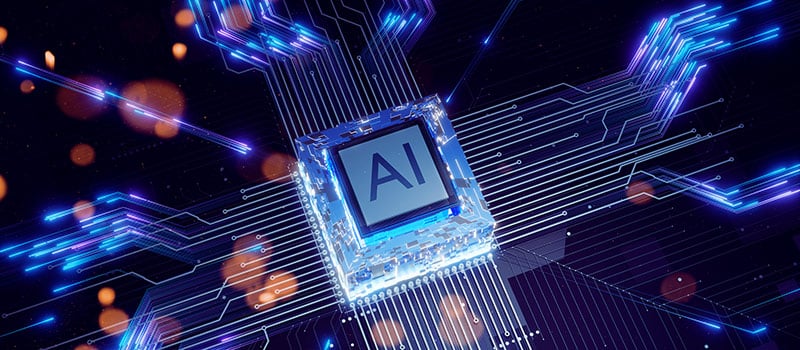Delays, cost overruns and safety concerns have long challenged the construction industry. Many of these issues can be traced back to gaps in planning, miscommunication on-site, or limited visibility across the project timeline.
Artificial Intelligence (AI) in construction project management offers a new way to approach these challenges: helping project managers make faster decisions and improving how teams work across the lifecycle of a project.
If you’re part of a growing firm or managing multiple builds across locations, knowing what AI can do (and what it can’t) can help improve outcomes on your next project.
Learn more: Optimising IT Infrastructure Management for Construction Hybrid Workforces
Where AI Fits Into the Construction Lifecycle
When it comes to the typical stages of a construction project, each phase presents different opportunities to apply AI-powered tools.
Here’s a breakdown of the core stages in the construction process and how AI is currently being applied:
Planning and Design
AI in construction management often starts here. These early decisions set the tone for the rest of the build, so getting accurate forecasts and well-structured plans is essential.
AI applications in this phase:
- Predictive analytics for project planning, timelines and budgeting
- Design simulation and clash detection using Building Information Modeling (BIM) with AI enhancements
- Site selection and feasibility studies using historical data and terrain analysis
Pre-Construction
This is the preparation phase, where AI helps project managers make smarter resourcing decisions and flag potential delays before work begins.
How AI helps:
- Estimating material needs more accurately using AI driven cost models
- Identifying supply chain risks or lead time issues early
- Forecasting labour requirements based on historical project data
Procurement and Supply Chain
Managing procurement can be unpredictable, especially when dealing with multiple vendors. AI powered tools can assist by analysing data from past projects to guide better purchasing decisions.
Key benefits:
- Reduce material waste and control costs
- Improve procurement timing and logistics
- Support better vendor selection based on performance data
On-Site Construction
This is where most of the visible progress happens, and also where many problems occur. AI is proving valuable for monitoring construction sites, tracking progress, and improving safety in real time.
AI tools in action:
- Computer vision systems to detect safety breaches or quality issues
- Real-time progress tracking through drones and image recognition
- Automated updates for project timelines based on live site data
Post-Construction and Maintenance
Once construction wraps up, AI continues to deliver value through smarter maintenance planning and asset management.
AI benefits after handover:
- Use of sensors and AI to predict maintenance needs and reduce downtime
- Tracking long-term building performance to improve energy efficiency
- Analysing tenant or user feedback to drive future design improvements
Learn more: 7 Cyber Security Tips for Construction ERPs
Practical Uses of AI in Construction Project Management
AI in construction project management is already being used on sites across Australia and globally to reduce delays and lower costs. These are some of the most practical and effective ways AI is helping construction managers stay on top of complex builds.
Smarter Project Planning
Planning a build involves hundreds of variables. AI driven tools can analyse data from previous projects to spot risks before they become costly problems.
What this looks like in practice:
- Automated scheduling that adjusts based on weather forecasts, material availability and labour
- Budget projections built on real-world cost data, reducing the risk of cost overruns
- AI-enhanced BIM to simulate and optimise designs early in the process
Improved On-Site Oversight
AI makes it easier to monitor construction sites without needing to rely entirely on manual checks.
Key benefits for construction managers:
- Site cameras combined with computer vision detect safety hazards, such as workers without PPE or unauthorised access
- AI tracks the pace of work and flags when projects fall behind schedule
- Quality control checks can be automated by comparing actual build progress with digital plans
Better Safety and Risk Management
Keeping workers safe remains a top priority. AI-powered tools can help identify risks early and reduce accidents.
How AI supports safety:
- Analysing site conditions to warn about potential hazards
- Monitoring equipment use to prevent dangerous practices
- Predicting injury risks based on site behaviour and environmental data
Predictive Maintenance and Equipment Tracking
Unexpected equipment failures cause costly delays. Using AI to predict maintenance allows teams to plan repairs before breakdowns occur.
Common use cases:
- Sensors detect wear and tear in machinery
- AI alerts teams when servicing is due, based on usage trends
- Improved uptime across the site and less unplanned downtime
Learn more: Cyber Insurance: Why Construction Firms Need It
What AI Does Well, and What It Can’t Do
Like any tool, AI has its strengths and limits. While its impact on construction project management is significant, it’s not suitable for every task or decision.
Where AI Delivers Strong Results
AI is best used to process large amounts of data quickly, spot patterns, and automate repetitive tasks. In construction, this translates to:
- Faster and more accurate project planning
- Reduced admin for construction managers and supervisors
- Greater visibility across timelines, resources and costs
- Improved forecasting and early warnings about delays or cost blowouts
Where AI Has Limitations
AI works best when supported by clean, reliable data. Incomplete or poor-quality data limits its effectiveness. However, AI should not replace the experience or intuition of a skilled project manager.
What AI can’t do:
- Make judgement calls in unpredictable situations
- Lead on negotiations or stakeholder communications
- Understand human context or adjust for last-minute design changes without direction
- Replace on-the-ground experience and leadership
AI in construction management can be a powerful assistant (but not a substitute) for skilled professionals. Used properly, it can help construction companies work smoothly.
Learn more: How to Reduce IT Costs Without Compromising Quality
Next Steps: Find the Right AI Tools for Your Project Management
While AI has its limitations, its ability to support project planning, monitor construction sites, improve safety, and predict maintenance makes it one of the most valuable technologies now available to the construction industry.
AI in construction management isn’t about replacing people; it’s about giving project teams better tools to make informed decisions, reduce delays, and avoid costly rework.
At Steadfast Solutions, we help construction companies and project managers choose, implement and support the right technology to streamline operations and improve project outcomes.
If you’re curious about how AI could support your next project, let’s have a conversation. Our team can guide you through the options with clear advice from IT professionals who understand the construction sector.




